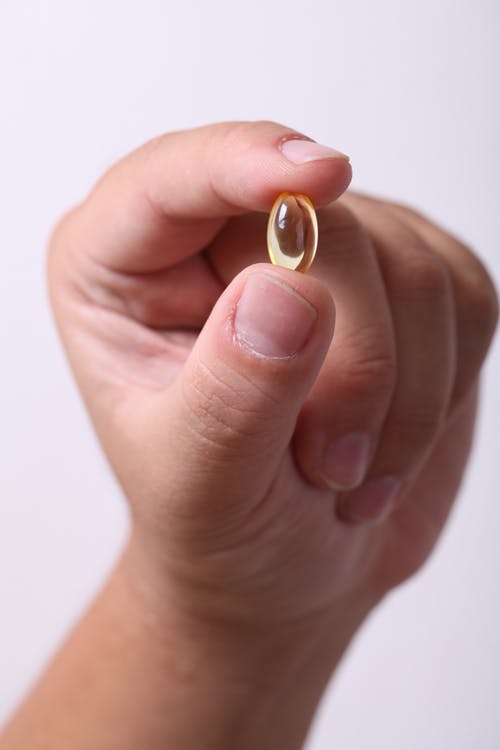By: Cecelia Wilken a Recent ASU Nutrition Student
My toddler is a picky eater. While my spouse and I work hard to put balanced meals on her plate, getting her to eat them is another story altogether. Nervous about her nutrition and whether she was getting the nutrients she needs to grow, I started giving her daily multi-vitamins. My parents gave them to me when I was a kid, so I didn’t question myself when I started giving them to her.

But the more I thought about it, the more I wondered, were they even necessary? Did I really need to be giving my daughter daily vitamins? Did she need them? Could giving her vitamins be detrimental to her health? After all, she was healthy, strong and vibrant without taking vitamins. So maybe my worries were unjustified.
Because children are constantly growing, a lot of their nutritional needs differ from adults. Here is a list of some of the vital nutrients that children need:
CALCIUM
Calcium is a fundamental building block for growing children, especially when developing strong bones and teeth. According to national surveys, most children over 8 years fail to meet the daily recommended intake of calcium. This can lead to an increased risk of fractures and osteoporosis later in life.
Daily recommendations for calcium:
- Ages 1-3: 700 milligrams (mg) of calcium daily.
- Ages 4-8: 1,000 mg daily.
- Ages 9-18: 1,300 mg daily.
Adolescents are especially vulnerable to inadequate intake of calcium. During the ages between 9-18, about 40% of lifetime bone mass is accumulated. Studies have found that for adequate bone mass to develop, consistent and sufficient calcium intake is needed. On and off supplementation has been found to fail to provide long-term benefits. These findings have emphasized the importance of developing healthy and balanced dietary habits early in life.
Calcium can be found in a lot of different foods, not just in dairy products. Many foods are fortified with calcium, like bread and pasta. Salmon and dark green vegetables like spinach and kale are also excellent sources of calcium.
VITAMIN D
Vitamin D works hand in hand with calcium, playing a vital role in calcium absorption. Simply put, it doesn’t matter how much calcium you intake if you don’t have adequate levels of Vitamin D. Vitamin D is found in some foods, but is mostly obtained from sun exposure.
Daily recommendation of Vitamin D:
- Age 0-1: 400 micrograms (IU/mcg) of Vitamin D daily
- Ages 1-13: 600 mcg daily
- Ages 14-19: 600 mcg daily
Very few foods contain naturally occurring Vitamin D; fatty fish such as tuna, salmon and mackerel and fish liver oils contain the highest amounts. Small traces of vitamin D can be found in beef liver, cheese and egg yolks, but the majority of the Vitamin D provided through the American diet is found in fortified foods like milk and ready-made cereals.
Due to the varying factors effecting UV exposure (cloud cover, smog, skin melanin content, the use of sunscreen etc.) it is difficult to determine general guidelines for sun exposure. Some researchers suggest that “5–30 minutes of sun exposure between 10 AM and 3 PM at least twice a week to the face, arms, legs, or back without sunscreen usually lead to sufficient vitamin D synthesis.” Individuals with limited sun exposure need to consider including Vitamin D rich foods into their diet.
VITAMIN E
Vitamin E acts as a fat-soluble antioxidant and is involved in helping maintain a healthy immune system. Vitamin E deficiencies are extremely rare within the population and are only seen in extreme cases of malnutrition or in correlation to specific diseases and disorders.
Daily recommendations for Vitamin E:
- Ages 1-3 need 9 IU of vitamin E daily.
- Ages 4-8 need 10.4 IU daily.
- Ages 9-13 need 16.4 IU daily.
- Teens need as much as adults: 22 IU daily.
Vitamin E is found naturally in abundance in nuts, seeds and vegetable oils, but are also found in dark leafy greens and fortified foods like cereal. Most Americans get their Vitamin E in the form of vegetable, canola and soybean oils that are found in processed foods.
B VITAMINS
Vitamin B12 (cobalamin), vitamin B3 (niacin), vitamin B6 (pyridoxine), and vitamin B2 (riboflavin) are essential vitamins that help support a healthy metabolism, provide energy, support heart health and a healthy nervous system. Of these, the most important is B12. Vitamin B12 is required for healthy red blood cell formation, proper brain and nerve function and DNA synthesis.
Daily recommended intake of Vitamin B12:
- Babies: about 0.5 micrograms daily.
- Toddlers: 0.9 micrograms daily.
- Ages 4-8: 1.2 micrograms daily.
- Ages 9-13: 1.8 micrograms daily.
- Teens: 2.4 micrograms daily (2.6 micrograms for pregnant teens
Vitamin B12 is found naturally in animal-based products like meat, poultry, fish and eggs. Since Vitamin B12 is not found in plant-based foods families who are vegetarian, or vegan may need to supplement Vitamin B into their diets. Children who also struggle to ingest meat on a regular basis may also need to supplement in order to achieve adequate levels.
IRON
Iron is another vital nutrient needed in the body. It plays a vital role in helping oxygenate blood, aids in metabolism, and is needed for adequate growth, development, normal cellular functions. Additionally, it aids in the synthesis of some hormones. While most people in the U.S. achieve adequate intake of iron through their diets, young children are susceptible to deficiencies. Since iron deficiencies are usually correlated to malnutrition, blood loss, and hereditary disorders it is possible that people with iron deficiencies will also have other nutritional deficiencies.
Daily recommendations for iron:
- Age 0-6 months: 0.27 mg
- Age 7-12 months: 11 mg
- Age 1-3 years: 7 mg
- Age 4-8 years: 10 mg
- Age 9-13: 8 mg
- Age 14-18: 11-15 mg
It should be noted that vegetarians require 1.8x more iron than those who eat meat in order to account for the differences in plant-based iron. Iron from plant-based sources is absorbed differently and carries oxygen differently than meat-based iron. As a result, vegetarians and vegans should consider supplementing iron into their diets. Additionally, as females grow up they require higher levels of iron intake than males.
Iron is found in many different foods. The richest sources come from lean meat and seafood, but it is also found in nuts, beans, vegetables and fortified grain products (like cereals). Breastmilk has enough iron in it to supply infants up to 4-6 months.
FIBER
While fiber is not a mineral or vitamin is a vital and necessary part of a balanced diet, especially in children. Foods that are rich in fiber often contain high level of other essential nutrients. To help maintain a growing, healthy digestive system, children need just as much, if not more, dietary fiber than adults. Fiber is found in high amounts in foods like broccoli, avocado, oatmeal, berries and beans.
Daily recommendations of fiber:
- Ages 1-3: 19 grams
- Ages 4-8: 25 grams
- Ages 9-13: 26-31 grams
- Ages 14-18: 26-38 grams

SOME IMPORTANT CONSIDERATIONS
- “Natural” does not always mean safe. For example, there have been reports of babies harmed after taking homeopathic sleeping/teething gels and tablets. The FDA is currently investigating such claims and reported against the use of these products in 2016. https://www.fda.gov/NewsEvents/Newsroom/PressAnnouncements/ucm523468.htm
- Federal regulations are less strict on dietary supplements than prescriptions or over-the-counter drugs. Ask your pediatrician for recommendations on dietary supplements before giving them to your child.
- Some dietary supplements are not in child-safe packaging. To avoid any accidents, make sure all medications and supplements are in child-safe packaging and are kept out of reach.
- Dietary supplements might interact negatively with prescription medications, or cause side-effects of their own.
- Follow the directions. Over supplementation can lead to potential problems such as vitamin toxicity.
TO SUPPLEMENT OR NOT TO SUPPLEMENT?
Like I mentioned before, my own daughter is picky, despises vegetables and rarely eats meat. I was worried about her and wondered if I needed to give her vitamins. After consulting with her pediatrician, they recommended putting her on a daily multi-vitamin and urged me to keep encouraging her to eat balanced meals. They told me that until she started eating more balanced meals regularly that supplementation of a daily multi-vitamin would be beneficial to her health. They even provided me with a prescription for a daily multi-vitamin for her.
So, should you give your own kid(s) vitamins? This is a great question! And the answer lies with your child. Is your child an extremely picky eater? Do they have access to a well-balanced diet? Are they thriving, energetic and growing well? If your child eats a well-balanced diet, likes their vegetables (lucky you!) and continues to thrive, then they might not need to take vitamins. Most doctors and professionals recommend that children (and adults!) try to get their vitamins and minerals right from their food. A well-balanced and varied diet will often be able to supply all the necessary nutrients in more than adequate levels.
For more information on vitamins check out these articles!
https://blog.fillyourplate.org/importance-vitamins-early-stages-life/
https://blog.fillyourplate.org/say-jell-o-vitamins/
https://blog.fillyourplate.org/importance-vitamin-k/
https://blog.fillyourplate.org/early-vitamin-supplement-reduce-infant-mortality/
*** Before giving your child any sort of supplementation, consult your family pediatrician to discuss your options and concerns first. Information about nutrients retrieved from the U.S. Department of Health & Human Services and the National Center for Complementary & Integrative Health.
References
Greer, F., Krebs, N. (2006) Optimizing Bone Health and Calcium Intakes in Infants, Children &
Adolescents. Pediatrics, 117(2), 578-585. doi: 10.1542/peds/2005-2822
American Heart Association (2015). Fiber and Children’s Diets. Retrieved from
http://www.heart.org/HEARTORG/HealthyLiving/HealthyEating/Nutrition/Fiber-and-Childrens
Diets_UCM_305981_Article.jsp#.W-3f6-hKhPY
Shaw, G. (2018). Vitamins and Minerals for Children: Calcium, Vitamin D, and More. WebMD. Retrieved
from https://www.webmd.com/health-insurance/features/family-vitamins#1
U.S Department of Health & Human Services (2018). 10 Things to know about dietary supplements for
children and teens. Retrieved from: https://nccih.nih.gov/health/tips/children
U.S Department of Health & Human Services (2018). Iron: Fact Sheet for Health Professionals. Retrieved
from https://ods.od.nih.gov/factsheets/Iron-HealthProfessional/
U.S Department of Health & Human Services (2018). Vitamin B12: Fact Sheet for Health Professionals.
Retrieved from https://ods.od.nih.gov/factsheets/VitaminB12-HealthProfessional/
U.S Department of Health & Human Services (2018). Vitamin D: Fact Sheet for Health Professionals.
Retrieved from https://ods.od.nih.gov/factsheets/VitaminD-HealthProfessional/

